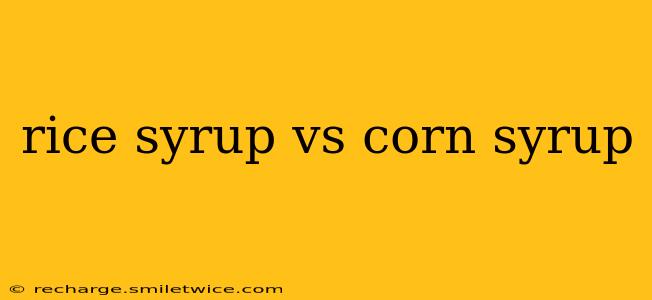Choosing between sweeteners can be tricky, especially when faced with options like rice syrup and corn syrup. Both offer sweetness, but their origins, nutritional profiles, and impacts on health differ significantly. This comprehensive guide delves into the key distinctions, helping you make informed decisions about which sweetener best suits your needs and preferences.
What is Rice Syrup?
Rice syrup is a sweetener produced from the enzymatic hydrolysis of cooked rice. This process breaks down the complex carbohydrates in rice into simpler sugars, primarily glucose and maltose. It boasts a milder sweetness compared to corn syrup and possesses a slightly caramel-like flavor. Several types of rice syrup exist, including brown rice syrup (made from brown rice) and white rice syrup (from white rice). Brown rice syrup generally contains more nutrients due to the bran and germ still present in the rice.
What is Corn Syrup?
Corn syrup, on the other hand, is made from the cornstarch of corn kernels. The manufacturing process involves breaking down the starch molecules into simpler sugars, mainly glucose. High-fructose corn syrup (HFCS), a common variant, contains additional fructose, increasing its sweetness. Corn syrup, particularly HFCS, is often criticized for its association with various health concerns.
Rice Syrup vs. Corn Syrup: Nutritional Differences
| Feature | Rice Syrup | Corn Syrup |
|---|---|---|
| Sweetness | Milder | Sweeter (especially HFCS) |
| Glycemic Index | Lower (varies depending on type) | Higher |
| Fructose Content | Low | High in HFCS, lower in regular corn syrup |
| Fiber | Small amounts (especially in brown rice syrup) | Negligible |
| Vitamins & Minerals | Small amounts (especially in brown rice syrup) | Minimal |
Is Rice Syrup Healthier Than Corn Syrup?
Generally, rice syrup is considered a healthier alternative to corn syrup, particularly HFCS. Its lower glycemic index means it causes a slower and more gradual rise in blood sugar levels compared to corn syrup. This makes it a potentially better choice for individuals with diabetes or those trying to manage their blood sugar. The presence of small amounts of nutrients in brown rice syrup also provides a slight nutritional advantage. However, it's crucial to remember that all syrups, including rice syrup, should be consumed in moderation as part of a balanced diet.
Does rice syrup cause weight gain?
While rice syrup has a lower glycemic index than corn syrup, it’s still high in calories and carbohydrates, leading to weight gain if consumed in excess. Moderation is key.
Is rice syrup good for diabetics?
While rice syrup has a lower glycemic index than corn syrup, it’s still important for diabetics to monitor their intake and consult with their healthcare provider before significantly altering their diet. It should be consumed in moderation and as part of a well-managed diabetic diet plan.
What are the side effects of rice syrup?
In general, rice syrup is well-tolerated. However, excessive consumption could lead to weight gain, blood sugar spikes (though less pronounced than with corn syrup), and digestive issues in some individuals due to its high carbohydrate content.
Is corn syrup bad for you?
The effects of corn syrup, especially HFCS, on health are a subject of ongoing debate. However, several studies have linked high consumption of HFCS to weight gain, metabolic syndrome, and increased risk of chronic diseases. Regular corn syrup is less concerning but still high in calories and carbohydrates.
Choosing the Right Sweetener: Your Needs Matter
The "best" sweetener depends heavily on individual needs and dietary goals. If you are looking for a lower-glycemic sweetener with slightly more nutritional value, rice syrup might be a better option than corn syrup. However, remember that moderation is key with any added sugar. If you have specific dietary restrictions or health concerns, it's always best to consult with a healthcare professional or registered dietitian for personalized advice.
